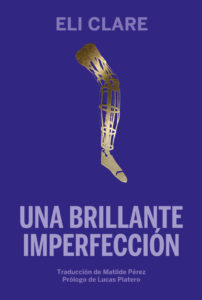Book Review
Eli Clare and the art of loving a brilliant and imperfect present
Sara Torres
The vitalist queer writing of Eli Clare is now accesible in Spanish. An essencial reading in the field of crip studies.

Una brillante imperfección connects Spanish-speaking readers with the work of “white, disabled, and gender queer” author and activist Eli Clare. His writing stands out both because its critical and political force, as well as because its affective and poetic dimension. Clare’s work is an example of radical crip writing which emerges from the vitalist encounter between queer theory and anti-ableist struggles.
The book invites us to face healing rather than disease. This implies, not abandoning the pursuit of the body-mind well-being, but rather analyzing the apparatus of social and economic interests that exists behind a compulsory desire for “healing”. In a context in which “ill” and “disable” bodies are considered tragic or undesirable, compulsory healing is the understanding of cure as a “return” to health, assumed as the “natural” state of human life. His writing helps us to understand that the ableist liberal project emanating from “developed countries” constructs illness and disability as problems which should be overcome through human technologies. Moreover, discourses on healing are framed within interests that go beyond those of the suffering bodies.
The promise of body “improvement”
From an intersectional perspective, the book shows how our desire for an ideal healthy-beautiful body is enhanced by an industry which benefits from it. This medical-cosmetic industry is fed by a sense of insecurity experienced by all bodies whose imaginary is determined by regulatory ideals of health and beauty, and especially benefits from those with non-normative corporalities. At the same time as he remains highly critical of such promises of “improvement” through consumption, the author recognizes the importance of our search for well-being. Clare’s book welcomes various voices that, given their own experience of physical pain and unwanted body transformation, articulate their lives around certain hope for healing. This position is compatible with maintaining a critical position towards ableism.
Analyzing the ideology of healing
What Clare calls “the ideology of healing” is linked to a set of industries and institutions which promise an “improvement” of the ill and the functionally diverse body. The focus on the promise of a better future may lead to a devaluation of the identities of those who live their lives differently, then degrading their specific knowledges and their acquired capacity for adaptation. The healing ideology, Clare studies, focuses both on the implantation of a desire for a “normal” future and the melancholy for a “better” past. Thus, any imaginary time of the body appears as more desirable than the present, even if the present provides the only material opportunity for the body to exist and interact.
Could we say that a body which affirms its beauty, pleasures and at the same time rejects identification with “white”, “able” and “healthy”, is socially legible?
Throughout the book, Eli Clare, with his vitalist and anti-normative position, makes visible a “disabled” body-mind that loves, enjoys life, and writes about it, breaking with the dark mythologies built by ableism when representing functional diversity.
Thanks to Clare’s reading, we get to understand how, through a “glorification of the future” (p.96), the promise of healing can rob us of the possibility of enjoying a brilliant and imperfect present. Sometimes, the fixation with healing makes us perceive the present state of the body as an error without potential, “a problem” which could be repaired by investing capital, power and energy in the pursuit of cultural norms.
The Spanish translation of A Brilliant Imperfection has been released by Con tinta me tienes, a publishing house committed to the publication of critical-creative texts which works at the intersection between feminisms, queer studies, postcolonial theory and the critique of ableism.
Brilliant imperfection. Grappling with the cure. Duke University Press. 2017.
Una brillante imperfección. Traducción de Matilde Pérez, prólogo de Lucas Platero. Editorial Continta me tienes. 2020.